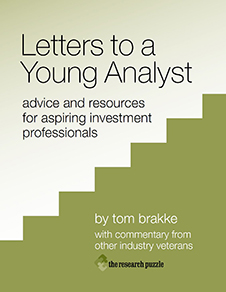
- Tuesday, June 23rd, 2009
- the card player
-
Sunday’s New York Times featured a lengthy article about Bill Gross, he of the draped necktie, and Pimco, the powerhouse bond manager he made in his image.The New York Times | It was titled, “Treasury’s Got Him on Speed Dial.” While much of the ground has been covered elsewhere, it is a worthwhile read for its window on the state of our financial system and the world of money management.
On one level, there is the guru culture of which I have written extensively (for example, in “i hired a guru”the research puzzle | As I say, “a guru is a consultant.” It pays to keep that in mind and not fall in love with him. and “in him we trusted”the research puzzle | During a recent guest lecture to MBAs, I asked students to fill in the “in [blank] we trust” for today’s market. One said, “Bill Gross.”) and which Gross has played very well throughout his career. His youthful success in Vegas is the stuff of legend, and he plays his cards as well as anyone — and has the extra advantage that he shares with Warren Buffett (his friend, according to the article) of being able to play them differently simply because of who he is.
His story is also the story of fixed income, a once-staid backwater of the markets that has grown increasingly complex and important since Gross started as a junior credit analyst. It often seems like 95% of the attention is on the equity market and 95% of the really important stuff is happening in fixed income, something that most financial journalists and bloggers realize only at times of absolute crisis.
The story says that Gross has “always been partial to mortgage bonds.” I have traditionally been wary of mortgages, because you get more cash flow when you don’t want it (when rates are dropping and prepayments on mortgages are plentiful) and little when you do (when rates are rising and you could reinvest at higher levels). Plus, with lots of dangerous structured product out there putatively in the “mortgage” arena, it was easy for the unaware to get clobbered. You can’t just play along in the mortgage market, and Gross and Pimco have demonstrated a mastery of it.
The article is light on the secret of his success, but Alan Greenspan (yes, the subject of the very same “in him we trusted” cited above) is quoted on Gross’ individualistic nature, and the opening paragraph shows Gross isolating his “lieutenants” in a daily meeting, away from computers and cell phones, to think and plan. Time and again over the years, Gross and Pimco have been ahead of the curve, unafraid to consider new possibilities and take bold bets. In my opinion, that is the single biggest factor in their success, and a great difference from most investment organizations, where ideological, product, and price trends are clung to for much too long.
The card player looks for shifting odds and the right times to make a move. He also is very good at talking his hand; “talking your portfolio” is always expertly done by Gross, be it in his written commentaries or via his distinctive voice on CNBC or elsewhere.
Of course, the main thrust of the article is that Pimco and Gross hold and wield tremendous power as the government tries to stabilize the financial system and cement the footings of a new prosperity. The bond market vigilantes of yore gained fame in their ability to affect monetary and fiscal policy. Now we have firms, with Pimco dominating, who are too big to ignore in crafting the solutions to our many financial problems. It’s very hard to argue that they shouldn’t be consulted or hired — they have demonstrated an expertise that is sorely needed — but you’d have to bet that Gross sees a payoff matrix that he likes for Pimco and for himself.
No one can fault him for that, but you come away wishing for something else. Had the dealer and the house not allowed the game to get out of control, we wouldn’t be thinking that our only way out was to peek over the shoulder of the smartest guy in the room.
